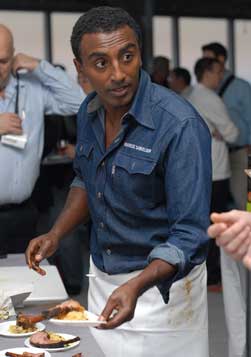 The automatic synonym for “black chef” is “soul food master.” Instead of black chefs building careers off their culinary training, soul food, as a cultural staple, has effectively attached itself to anyone with dark brown skin. Unfortunately, the stereotype has pigeonholed black chefs attempting to build names in other cuisines. Entering a restaurant, it’s assumed that black chefs specialize in fried chicken, baked macaroni and cheese, and collard greens. While some embrace the stereotype, others work to flex their skills outside soul food establishments.
The automatic synonym for “black chef” is “soul food master.” Instead of black chefs building careers off their culinary training, soul food, as a cultural staple, has effectively attached itself to anyone with dark brown skin. Unfortunately, the stereotype has pigeonholed black chefs attempting to build names in other cuisines. Entering a restaurant, it’s assumed that black chefs specialize in fried chicken, baked macaroni and cheese, and collard greens. While some embrace the stereotype, others work to flex their skills outside soul food establishments.
 Marcus Samuelsson is the most popular, contemporary black chef known for cooking outside the soul food arena. As he’s built a career in fine dining establishments, working as the Executive Chef of the world-renowned Aquavit, opening several restaurants, and becoming a renowned culinary name at a young age, Samuelsson is often called an anomaly in the food industry, as black chefs rarely get any shine. Could the next generation of black chefs follow in his footsteps? Absolutely. Is it likely that we’ll see a spike in black chef visibility sooner versus later? The future is uncertain. As black student enrollment is low in top culinary institutions, it’s unlikely that black chefs will have access to training positions at top restaurants, effectively closing them out of the insider circle.
Marcus Samuelsson is the most popular, contemporary black chef known for cooking outside the soul food arena. As he’s built a career in fine dining establishments, working as the Executive Chef of the world-renowned Aquavit, opening several restaurants, and becoming a renowned culinary name at a young age, Samuelsson is often called an anomaly in the food industry, as black chefs rarely get any shine. Could the next generation of black chefs follow in his footsteps? Absolutely. Is it likely that we’ll see a spike in black chef visibility sooner versus later? The future is uncertain. As black student enrollment is low in top culinary institutions, it’s unlikely that black chefs will have access to training positions at top restaurants, effectively closing them out of the insider circle.
It’s no secret that becoming a top chef requires contacts within the restaurant business. It’s all about whom you know, what press is praising your name, and elite culinary training. Unfortunately, the majority of black culinary professionals occupy low-paying, non-managerial positions at unknown eating establishments. This limits growth, networking potential, and crossover capabilities to the fine dining scene. Fair or unfair, black chefs cannot climb the ranks without training at a prestigious non-soul food restaurant. Thus, the ladder is cut off for most black chefs to achieve mainstream success, and for more to follow behind them.
 As black chefs are limited in cuisine training, it perpetuates the soul food establishment reign on black communities. In terms of entrepreneurship, black chefs receive funding to open restaurants, if they’ve proven cuisine mastery. To open a fine dining, non-soul food restaurant in a predominately black community, a black chef will need to hold an executive position at a popular fine dining establishment and build enough clout to gain the trust of investors. For example, Samuelsson opened Red Rooster, an eclectic fine dining spin on American cuisine, in Harlem. If he had not won Top Chef Masters Season 2 (Bravo TV), worked as the Executive Chef of Aquavit, or created a brand that placed him outside of the soul food chef stereotype, it’s unlikely that Red Rooster would be standing today.
As black chefs are limited in cuisine training, it perpetuates the soul food establishment reign on black communities. In terms of entrepreneurship, black chefs receive funding to open restaurants, if they’ve proven cuisine mastery. To open a fine dining, non-soul food restaurant in a predominately black community, a black chef will need to hold an executive position at a popular fine dining establishment and build enough clout to gain the trust of investors. For example, Samuelsson opened Red Rooster, an eclectic fine dining spin on American cuisine, in Harlem. If he had not won Top Chef Masters Season 2 (Bravo TV), worked as the Executive Chef of Aquavit, or created a brand that placed him outside of the soul food chef stereotype, it’s unlikely that Red Rooster would be standing today.
In particular, Samuelsson chose to build Red Rooster in Harlem, as it’s often black chefs that want to invest in cuisine diversity for black communities. Stepping beyond the call of a fine dining establishment, Red Rooster’s staff teaches community cooking classes to encourage good nutrition and better eating habits, in addition to hiring up and coming black chefs for professional training. It’s these efforts that break the cycle, and encourage more young people to pursue culinary careers. While African-Americans have a history of performing menial labor in kitchens, the culinary scene has expanded to give serious black students the opportunity to have fulfilling professional lives in the food industry. Investing in young black chefs is the best bet that the black community can make to expand fine dining options within the community, decrease the number of fast food joints, and diversify beyond soul food restaurants.
What do you see as the future for black chefs? Weigh in.
Image Credit: New York Times, Ethiopian Review, Harlem Be Spoke







Does Samuelsson really ‘count’ though? He’s European, born in Ethiopia, so while he’s Black, he’s not African American, and has a different ‘experience’.
I’ve been lucky I’ver trained at a top culinary school, the California Culinary Academy, I ‘ve been in the industry 22 years I trained at One Market Restarant with super celeb chef Bradley Ogden,
I’ve worked as a sous chef for Wolfgang Puck, Chef de Cuisine at the a five star five diamond hotel restaurant in West Hollywood and was executive chef a up scale soul foodrestaurant in Beverly Hills,Ca. Let me tell you first hand being black in this industry is very hard, and most places I’ve worked I was the black in the kitchen weather I was the chef or not. No one want to invest in the black chef no matter how good you are. Unless you are Eurpean like Robert Gasby of Bedford in Houston, Texas. The situation is sop bad it insprited me to write Beyond Soul Food, Modern American Heritage Cuisine to demostrate we are African-American Chefs with a rich heritage…we were in the kitchens long before this culinary scence was popular so now that it’s a so called big thing they box out the black chefs, this country really need to take a good long look at it self for it is still a very racist place to live…………call it like it is…. thank you
I’m curious about the support system black chefs have created for themselves. I think it is important to continue to preserve and promote soul food in the culinary world. That can be done without compromising the success of black chefs who specialize in other cuisines.
http://sisterescape.blogspot.com/2011/07/in-defense-of-soul-food.html
i do think soul food has a rich hertiage and though at a black owned resturant it doesnt have to be the only cuisine offered it is not something to be shunned as if it is “less than” other cuisines and that European inspired food is the standard. We need to stop only thinking our traditions have worth once they are approved by people beyond the black community. For instances greens, kales and others as well as “grits” or polenta is now accepted and used in more upscale resturants that are majority visited and staff by white people and now those things are alright. We should not have to get the nod of approval from mainstream America in order for us to appreciate our own food. Now I am all for black chefs expanding our cuisine outside of soul food please do but don’t discount the soul food resturants as if they are less than other cuisines.
I agree with chef petty 100% .Unfortunately too many African American chefs either focus on the negative sterotypes about soul food or dismiss it as unsophisticated all together. A lot of soul food restaurant owners strive for what can only be described as mediocrity because they’ve made a really poor guess of what their customers want and what a lot of the African American dinning public wants and what they want to see from my research is the elevation of soul food to high cuisine its is a movement that has been long overdue. CHEF PETTY and Chefs like The late Great PATRICK CLARK are proof positive that not only is soul food something African American Chefs should be proud of , they should be using their skills and knowlege of this reveared cuisine as a medium to innovation and to elevate soul food to high cuisine. Let’s be clear that a lot of what is known today as Nouvelle, Haute and Modernist cuisine disciplines started as French peasant food.
I agree, I’ve been working in the foodservice industry for over 15 yrs. I presently work as a chef in my own Personal chef Services in the evenings and also work for a local deli durning the day located in the New Orleans. I have found that Racism exsist in restaurants trough out our fine city. Far too often I’ve seen Creativity and great creation with no recognition in promotion or any type of rewards. In most cases black chefs and cooks are paid lower wages and are not hired in traditional higher earning positions in most of the traditional family/private own restaurants throughout the city. There are numerous restaurants that are more than 50% black in employment yet have never had a black waiter or waitress on staff. Some of these same restaurants do allow blacks to work as busboys yet, never wait tables. I remember working for one of these family restaurants as I was completing my acf training during culinary school. When it was time for me to learn the books, cost out menu’s, and learn the management side of the establishment, I was told that wasn’t possible. I had to change jobs to complete my apprenticeship. That same restaurant is world known and when I left in 1999, had never hired a black waiter. I inquired why before I resigned and was told, “none ever applied”.
That’s funny because my parents are trying to get me to go into that field, I think its not a bad idea but like what I heard above soul food is not the way to go if you want to make it big. Its one thing if you have it for like a certain holiday like MLK, or a few days in black history month, but its another if you have it freaking nearly everyday as the main thing you serve. Another huge problem is that most usually stay in urban areas, maybe they should take a risk sometime and step out of that arena.